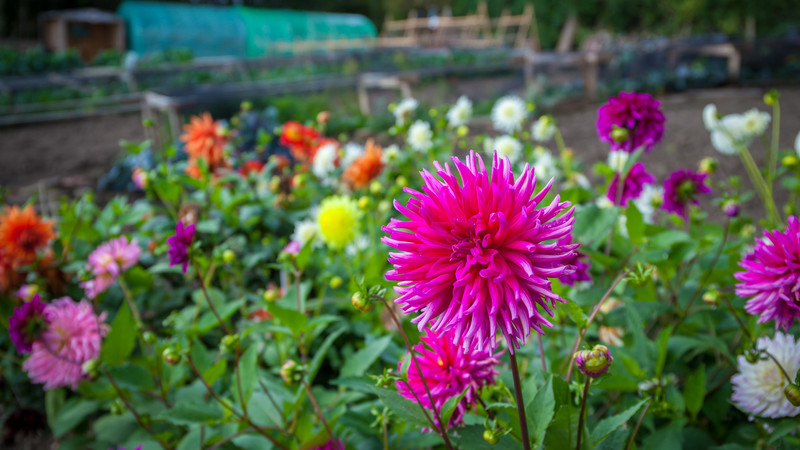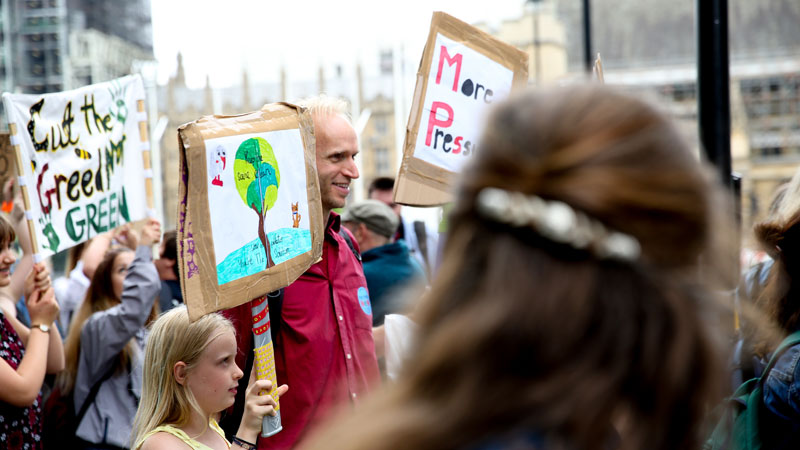A glimpse of a hopeful future

One thing is for sure: we’ll each remember the spring and summer of 2020. But in a way we could not have imagined, writes CAFOD’s Helen Moseley, it has also given us a glimpse of a more hopeful future.
For many people this year has been the most desperate of times. The memories for some will be of worry and strain, and for many, grief. Many of us have felt increased anxiety. All of us have experienced life very differently.
In a way we could never have anticipated, the pandemic has also given us a glimpse of a more hopeful future. All over the world people reported clearer skies than they had ever known due to the dramatic reduction in air pollution. Wild animals were spotted venturing further from their usual habitat . Less noise from vehicles and planes enabled us to appreciate the peace of nature a little more. Many of us grew vegetables for the first time.
Learning to live simply
As Pope Francis writes in Laudato Si’, we found an opportunity to ‘slow down and look at reality in a different way.’ Being in lockdown gave us no choice but to drive less, shop less, rush around to our next appointment less. And many of us found, to our surprise, that it was somewhat of a relief.
We also rediscovered the power of community. Offering a helping hand to a neighbour, coming together to display our gratitude to frontline workers, donating to the local foodbank. It’s been a time of great creativity and invention. As a human species we sang together virtually, united across continents. We donated to help those struggling more than ourselves. We have united in kindness.
What does this mean for our future? Will we return to our old models of living, as soon as we are able? Will the familiar hue of pollution fill our skies and the endless hum of traffic fill our neighbourhoods? As much as we need it, will economic growth be our only barometer of success? Will we look back to 2020 as a unique point in time? Or could we make a different choice, and imagine the lessons this profound experience can teach us?
Join Pope Francis’ call for debt forgiveness
The climate crisis is still with us
It’s easy to forget, but for a while, 2020 was shaping up to be a huge year for climate action. With several crucial international summits scheduled, including the UN COP26 climate conference once planned for Glasgow in November, calls from ordinary people for their governments to take bolder action on climate were becoming louder and louder. Then the world found itself facing a pandemic and global attention moved away.

But the climate crisis is still with us. And more than ever, we can see that everything is interconnected. The cry of the earth is no different from the cry of the poor. We have to take care of our earth and each other.
As our sisters and brothers across the Global South contend with the coronavirus, we can see the horrifying implications for their livelihoods as well as their health. CAFOD’s local experts are working desperately hard to help them. But many of the world’s poorest countries were already dealing with the brutal effects of climate change, be that flooding, stronger cyclones or crops that can’t grow with erratic rainfall and hotter temperatures. Governments of richer nations need to help these countries cope with the pandemic and the climate crisis. Lives are being decimated by both. Everything is interconnected.
Learn more about CAFOD’s climate campaigns
Restore our common home
2020 has shown us what could be, but without a change in long-term policies and without huge coordinated efforts by governments across the world, emissions will soon rise again. We need to call on our leaders to ‘build back better’, so that we can have a fairer, more just society after the pandemic, and so that the health of our planet is paramount.
Many of us hoped that 2020 would bring a fundamental shift in climate policy. It hasn’t worked out as we expected, but it’s given us something else – an alternative vision of how we can live on this earth, our common home. We can harness the power of the wind and sun. We can nurture our land and treasure our species. We can breathe better air and clean up our oceans. We can get our house in order for the generations to follow. But we are going to have to make it happen.
As Pope Francis reminds us, “It is we humans above all who need to change. A great cultural, spiritual and educational challenge stands before us. … Yet all is not lost. Human beings, while capable of the worst, are also capable of rising above themselves, choosing again what is good, and making a new start.”
Between now and September, we want you to send us a photo of you creatively displaying the words Cancel The Debt. We’re collecting photos of supporters from across England and Wales, and we will put your photos together in October to send a message to world leaders that it’s time to #CancelTheDebt.
Find out how to get involved with #CancelTheDebt.
By adding your face and voice, you can show that debt isn’t something the international community will stand for.